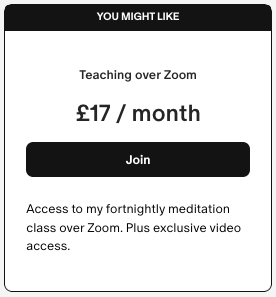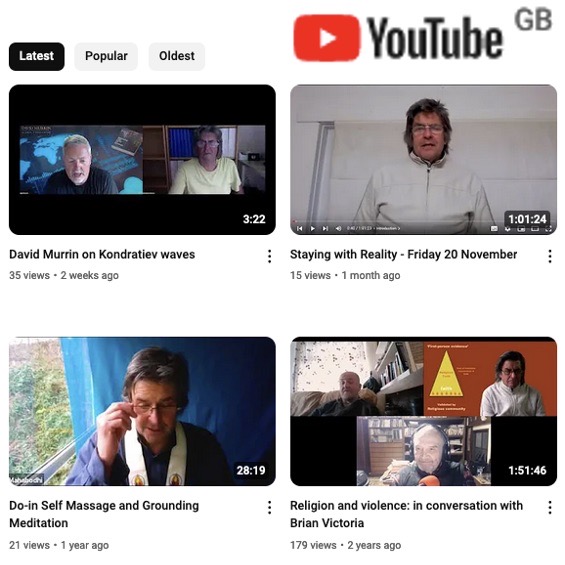Ideas without a ground
Below is an excerpt from my forthcoming book… © Mahabodhi Burton 7 minute read This excerpt is from Chapter 4: ‘Postmodernism and the academic mindset’ and follows on from The Academic Mindset. Ungrounded ideas I think that all academics do know—on some deep level within their souls—that their academic objectivity is of limited value: in the sense all ideas are useless without ‘a ground’. What I mean is that—respecting the Law of Conditionality—no idea exists in a vacuum. The idea that they do is a dangerous idea in itself—to imagine that ideas can live in a self-referential world of their own (without consequences) itself has negative consequences: ideas must always be tested by their actual effect on the world. Marxism is a good example: it is based on a simple, appealing, idea about economics: Marxism seeks to explain social phenomena within any given society by analysing the material conditions and economic activities required to fulfil human material needs. It assumes that the form of economic organisation, or mode of production, influences all other social phenomena, including broader social relations, political institutions, legal systems, cultural systems, aesthetics and ideologies. These social relations and the economic system form a base and superstructure. As forces of production (i.e. technology) improve, existing forms of organizing production become obsolete and hinder further progress. Karl Marx wrote: “At a certain stage of development, the material productive forces of society come into conflict with the existing relations of production or—this merely expresses the same thing in legal terms—with the property relations within the framework of which they have operated hitherto. From forms of development of the productive forces these relations turn into their fetters. Then begins an era of social revolution.”[1] ‘These inefficiencies manifest themselves as social contradictions in society which are, in turn, fought out at the level of class struggle.[2] Under the capitalist mode of production, this struggle materializes between the minority who own the means of production (the bourgeoisie) and the vast majority of the population who produce goods and services (the proletariat). Starting with the conjectural premise that social change occurs due to the struggle between different classes within society who contradict one another, a Marxist would conclude that capitalism exploits and oppresses the proletariat; therefore, capitalism will inevitably lead to a proletarian revolution. In a socialist society, private property—as the means of production—would be replaced by cooperative ownership. A socialist economy would not base production on the creation of private profits but on the criteria of satisfying human needs—that is, production for use.’[3] We can see how, within the confines of its own argument, much...
Uroboric incest
Below is an excerpt from my forthcoming book… © Mahabodhi Burton 3 minute read This excerpt is from the chapter ‘The Woke Mind Virus,’ and it follows on from the section on taking offence. Uroboric incest This desire for white liberals to ‘disappear’ and abase themselves when faced with the accusation of ‘white privilege’ is an aspect of being drawn down into unconsciousness: it reminds me of the concept of uroboric incest[1] which Erich Neumann explores in The Origin and History of Consciousness,[2] where he says: ‘Many forms of nostalgia and longing signify no more than a return to uroboric incest and self-dissolution, from the unio mystica of the saint to the drunkard’s craving for unconsciousness and the “death-romanticism” of the Germanic races.’ ‘Uroboric incest is a form of entry into the mother, of union with her, and it stands in sharp contrast to other and later forms of incest. In uroboric incest, the emphasis upon pleasure and love is in no sense active, it is more a desire to be dissolved and absorbed; passively one lets oneself be taken, sinks into the pleroma [the totality of divine powers], melts away in the ocean of pleasure—a Libestod [love death]. The Great Mother takes the little child back into herself.’ The uroboros is and ancient symbol depicting a serpent or dragon eating its own tail.[3] In a blog post by eirboe entitled ‘Alcoholism and the Urorobos, a reason to drink?’[4] the author says how the very numbness in his body when drunk brought Neumann’s description of uroboric incest to mind, ‘As well as [Jordan] Peterson’s lectures on Adam and Eve, as uroboric incest is basically what he describes the Fall was from. Getting drunk is becoming unconscious of your own “nakedness” and vulnerability, becoming unconscious of your own struggle between right and wrong. It’s not until the next morning, with a terrible hangover, that you realize what you did the night before was probably both dangerous and wrong. But the freedom of not knowing that for a few hours!’ Uroboric incest is an unhealthy and sometimes pathological relationship that a person has to their unconscious; it is a refusing to take on the burden of consciousness and instead desiring to remain unconscious. Uroboric incest can be understood as a love of the unconscious; refusing to take on a higher level of consciousness when demands are placed upon us can be a natural reaction, as consciousness can be an onerous obligation. But consequences can emerge if person refuses to enter into life consciously and instead remains unconscious: remaining unconscious may be easier than facing conscious realization...
Buddhists in Silicon Valley
Below is an excerpt from my forthcoming book… © Mahabodhi Burton 12 minute read Check out this fascinating 7-minute excerpt from the chapter ‘Transhumanism and Alienation,’ which explores the connection between Buddhism and Silicon Valley, including the concepts of ‘Buddhism-lite’ and Wisdom 2.0. Are you concerned about the dilution of Buddhism in a secular context? This excerpt is a must-read. Buddhists in Silicon Valley Emma Grey Ellis, in her WIRED review[1] of Dan Zigmond’s book Buddha’s Office–Dan is a Facebook (and Microsoft, Instagram, YouTube, and Google) alum, data analyst and Zen priest[2]–spells out the strong connection between Buddhism and Silicon Valley. ‘In Silicon Valley, you are always an iPhone’s throw from a Buddhist. Some of them will have arrived at their Buddhism the usual way—family, culture—but a fair few will have adopted it later in life, as a piece of their adult identity. Even if they’re not checking the “Buddhist” box on the census, you’ll know them by their Zen meditation retreats, their references to ‘the Middle Way’, their wealth … of Steve Jobs trivia. Did you know that Steve Jobs was a Buddhist who studied under Zen priest Kobun Chino Otogawa and once wandered India in search of a guru? Did you know Jobs swiped Apple’s famous “Think different” slogan from the Dalai Lama? Did you know Buddhism and tech companies have a grand historical ‘synergy’?[3] When I moved to California from the East Coast, I did not. After living and working in San Francisco for a few years, I see Buddha everywhere.’ Wisdom 2.0 ‘Every February or thereabouts, representatives from tech companies like Google, Facebook, Twitter and PayPal gather in San Francisco for Wisdom 2.0, a conference that aims to unite mindfulness with technology.’[4] ‘Over the course of several days, high-profile digerati interact with spiritual luminaries like Eckhart Tolle, Jon Kabat-Zinn and Joan Halifax, to explore topics such as ‘mindful management,’ ‘conscious leadership,’ and ‘wisdom in the workplace’ through speeches, dialogues, and group sessions.’[5] In a 2014 article called The selective awareness of Wisdom 2.0, Darrin Drda asks whether in taking an ancient practice, removing it from its context, stripping away its ethical imperatives and selling it for a profit, ‘Is the goal of the corporate mindfulness movement to comfort the already comfortable?’[6] By 2001, Slavoj Zizek had already pointed out a link between Western Buddhism and late capitalism: ‘Marxist philosopher Slavoj Yizek has long argued that “Western Buddhism,” as he calls it, is an ideal palliative for the stresses of life under late capitalism—their “perfect ideological supplement.” ‘“It enables you to fully participate in the frantic pace of the capitalist game,” Žižek explains in a 2001 essay...
Compassion and its ‘enemies’
Below is an excerpt from my forthcoming book… © Mahabodhi Burton 10 minute read Diving into the Preface of ‘The Buddhas and Global Governance,’ this excerpt digs into the intricate dynamics of compassion and its adversaries. Building upon the narrative of ‘ The Twitter Files,’ it navigates through the suspension of Jordan Peterson from Twitter, shedding light on the complexities surrounding bringing the right amount of compassion to transgender issues. Join me as I embark on a journey towards understanding the nuances of compassion and where the Middle Way lies. The ‘banning’ of Jordan Peterson from Twitter The ‘great sin,’ however, on ‘Old Twitter’ was to comment on a transgender issue: as Jordan Peterson found to his cost when he was suspended[1] from Twitter in July 2022 for allegedly violating their rules against hateful conduct. Mikhaila Peterson said her father would be off the platform until he deleted the tweet. Conservative commentator David Rubin commented on the incident, “The insanity continues at Twitter. @jordanbpeterson has been suspended for this tweet about Ellen Page. He just told me he will ‘never’ delete the tweet. Paging @elonmusk.”’ [2] only to be suspended himself, at which, ‘Rubin and Mikhaila called on Tesla CEO Elon Musk – who recently bid $44 billion to take the platform over in efforts to promote free speech.’[3] Musk eventually took over Twitter in October 2022. ‘The crime’ Peterson had claimed in a tweet on 24 June 2022 that ‘The Umbrella Academy’ star Elliot Page, who formerly went by the name of Ellen, and who had announced his transition in December 2020, had his ‘breast removed by a criminal Physician.’[4] Peterson had said ‘her’ instead of ‘his,’ tweeting, ‘Remember when pride was a sin? And Ellen Page just had her breasts removed by a criminal physician.’[5] (Emphasis added) Peterson explains his thinking behind the tweet: ‘Page is a star, and she advertised her transformation and made the claim that this is revolutionized her life and then she displayed her new body in a public forum and got 1.7 Instagram likes for it, and probably enticed, let’s say, one young girl who is confused into becoming sterile, which is one too many for me.’[6] Peterson’s tweet, along with other controversial tweets and statements in interviews, led the Ontario College of Psychologists to order him to undertake a social media coaching program; he appealed the decision, and lost:[7] ‘Dr. Peterson is subject to regulation by the College of Psychologists of Ontario, which received complaints about Dr. Peterson’s public statements. Following an investigation into those of Dr. Peterson’s statements alleged to be “transphobic, sexist, [and] racist,”...
Guilt
Below is an excerpt from my forthcoming book… © Mahabodhi Burton 15 minute read This excerpt is from the chapter ‘Woke As Old Testament Religion’ and goes into guilt in all its forms, including Buddhism’s view of where guilt is helpful and where it is not. An accelerating trend in taking offense In 2008, Christian Lander joked in Stuff White People Like that being offended was something a certain brand of white people enjoyed, alongside attending film festivals and wearing vintage T-shirts. Today, such a person hearing that joke would likely: ‘launch into a hissing tirade about how there is nothing funny about people trying to dismantle the prevalence of white supremacy and all whites’ “complicitness” in it. If he were to write that book today, Lander would be unlikely to include that joke, which is an indication of the extent to which there is something in the air that we hadn’t seen until quite recently.’[1] A critical mass of white liberals no longer quietly pride themselves in knowing they need to be offended about certain things, ‘but now see it as a duty to excoriate and shun those (including black people) who don’t share their degree of offense. To some, all of that may sound like mere matters of manner and texture.’[2] Third Wave Antiracism, McWhorter claims, harms black people in the name of its guiding impulses: in insisting that it is racism when black boys are overrepresented among those suspended or expelled from schools for violence, ceasing to suspend or expel perpetrators only leading to violence persisting and a declining skillset among the young black population, which white liberals are complicit in. The high priests of Woke today: Joel Kotkin’s Clerisy (See Chapter 3) tell us just how we should speak and think. Religion, McWhorter contends, has no place in the classroom or elite university, nor in our codes of ethics, nor in delineating how all members of society are to express themselves, and ‘almost all of us spontaneously understand that and see any misunderstanding of the premise as backward.’[3] ‘Yet, since about 2015, a peculiar contingent is slowly headlocking us into making an exception, supposing that this particular new religion is so incontestably correct, so gorgeously surpassing millennia of brilliant philosophers’ attempts to identify the ultimate morality, that we can only bow down in humble acquiescence.’[4] The liberal middle-classes are often fully unaware of just what they are doing: ‘Question these people for real and they howl as if having a finger pulled backward. But it isn’t that they don’t want their power taken away: The Elect see themselves as speaking truth to power, not as occupying it....







 Users Today : 21
Users Today : 21 Users Yesterday : 23
Users Yesterday : 23 This Month : 479
This Month : 479 Total Users : 13906
Total Users : 13906
